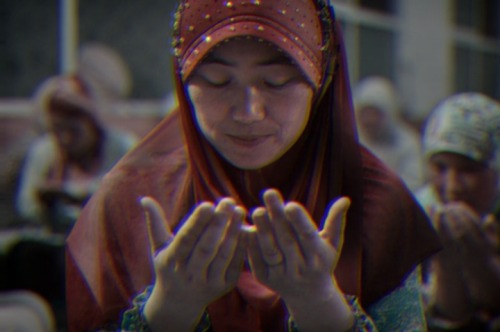As human beings, our life in this world is characterized by fluctuating conditions making us happy and sad. No one experiences perpetual bliss or misery. Life by its very nature is a test.
Allah says: “He is the One that has created Life and Death in order to test who amongst you is best in conduct.” (Qur’an, 67:2)
Pleasant and favorable conditions demand us to be grateful and humble or adverse conditions require us to be patient and to seek Allah’s help.
As Believers we ought to believe that every condition is a manifestation of the Will of Allah. What has passed us was not meant to befall us and what has befallen us was not meant to pass us. Assistance comes with patience, relief after affliction and ease after difficulty (Tirmidhi).
Our faith and belief is tested when we undergo difficulties and afflictions. These difficulties may be physical, emotional, financial and/or psychological. This is borne out by the following verse: “Verily We will test you with some fear, hunger, and loss of wealth, life or the fruits (of your labor.” (Qur’an, 2:155)
These adverse conditions may at times be upon an individual, a family, a community or upon a large section of the Ummah as is the current case for so many Muslims. Muslims believe in Islam and making supplication or du`a before Allah Almighty is what they consider as a weapon in their hands to solve their problems. Prayers or du`a are panacea for the present problems facing the Ummah today. In Hadith we find that the Noble Messenger of Allah (peace be upon him) came across a community of people going through a tribulation. He advised, “Why don’t they supplicate (make du`a) to Allah for assistance?”
The problem with us is that du`a for us has become a ritual and a final resort after all the options and the means have been exhausted. du`a, according to a Hadith, has the unique ability to change destiny (Tirmidhi).
All the Prophets (peace be upon them), as we find in Qur’an, resorted to supplications as their ultimate ‘weapon’ to solicit Allah’s help when all their efforts would fail while reforming nations in their respective hostile environments.
A very poignant example of this is the incident of the Prophet Nuh (peace be upon him). Allah Almighty mentions the incident in the following words, “The people of Noah denied and they belied Our Servant and said, ‘He is a madman’ and threatened him. He therefore supplicated (through du`a) to his Lord (saying), ‘I am overpowered! Assist me?’ We therefore opened the gates of Heaven, with water flowing furiously. (And) We caused springs to gush out from the earth, so that the two waters met in a quantity that had been destined.” (Qur’an, 54: 9-12)
The above verses in the original Arabic language are very powerful and conjure up an image of vast volumes of waters gushing forth profusely from both the earth and the skies until the earth was waterlogged. All those who had ridiculed the Messenger were drowned in that deluge. We can safely say that the Prophets (peace be upon them), in discharging their responsibility of calling toward the Creator, qualified for His assistance. And the action that motioned this assistance in favor of the Prophets (peace be upon them) was that of lifting their hands in du`a.
At the time of the battle of Badr, with the future of Islam under threat, when a small ill equipped band of 313 Muslims faced an army of 1,000 well armed, the Noble Messenger of Allah (peace be upon him) spent the entire night on the eve of the battle begging and supplicating unto Allah for His assistance and Allah Almighty the following day granted the greatest victory in the annals of Islamic history.
In another such incident, when Sultan Salah Al-din Ayyubi received news of the Crusader’s ships sailing toward them with reinforcements, he retired to the masjid and spent the night in prayer, beseeching and begging Allah Almighty’s assistance. In the morning prayer, he told a pious man, “Please make du`a, so that the enemy ships left the shores carrying reinforcements.” The person replied, “Don’t fear, O Salah Al-Din. Verily the tears of the night have drowned the enemy ships.” A short while later news was received that the ships had sunk.
Such is the power of du`a which has been rightfully referred to by scholars as the ‘weapon’ of a believer.
In a Hadith, it is mentioned that ‘Du`a is the essence of worship.’ (Musnad Ahmed & Tirmidhi)
In fact in another Hadith it is mentioned that, ‘Du`a is worship.’ (Sunan Abu Dawood)
If one ponders and reflects on the above Hadith one will realize that they are very clear, definite and absolute statements. How is it that we give so little attention to that described as both the ‘essence’ of worship as well as worship itself?
The reason for this is because we tend to look at the outward form of du`a which, when compared to other’s acts of `Ibadah (worship) is ‘less strenuous’ and ‘exertive’ in terms of time, place, language and physical exertion. While there are conducive and opportune moments when duas are accepted in relation to the above there are no restrictions or specifications on the act of du`a. Du`a can be made at any time, in any place, in any language, when a woman is in her menses and also in a state of ceremonial impurity.
Du`a is the ultimate form of `Abdiya (bondsman-ship) in that it is an expression of one’s total dependence on Allah Almighty knowing that every single condition — good or bad, happy or sad, benefit or loss, wealth or poverty — is exclusively in the hands of Allah Almighty and that He alone is the ultimate Causer of causes. With Him are the keys to His unlimited and unending treasures.
Du`a is that act which ‘connects’ the slave to his Master. The slave lifts his hands as begging bowls in an expression of begging as a beggar does. “O mankind! It is you who stand as beggars in your relation to Allah, and it is Allah Who is Free of all wants, Worthy of all praise. (Qur’an, 35:15)
In all humility, with an attentive heart, having full hope in his Creator, Maker, Sustainer and Cherisher, one attracts the gaze of mercy of the Master Who feels shy in turning His slave away empty-handed (Tirmidhi, Ahmed, Abu Dawood).
If it is not in the nature of a mother to turn her child away empty handed no matter how disobedient a child may be, how is it possible that the One who is the most merciful and who has placed mercy in the hearts of all mothers turns away His slave, empty handed? How is it possible for the One Who becomes angry when His slaves do not supplicate to Him not to be happy when they do? (Sunan Ibn Majah)
Continuously turning to Allah Almighty in du`a is a sign of one’s conviction in Him and the more one turns to Him, the more one’s faith increases. du`a is a condition of the heart and conversation with one’s Maker in the language of one’s choice.
A Hadith says:
Du`a is a means of beseeching Allah Almighty for the fulfillment of all our needs no matter how mundane or insignificant as it may be; or significant as facing overwhelming odds in the battlefield. (Tirmidhi).
In the vocabulary of Islam, there are no such words as impossible, unattainable and/or insurmountable. du`a in times of ease is gratifying and engenders humility while at the same time it serves as an assurance of our duas being accepted in times of difficulty, according to Tirmidhi.
Hadith Regarding the Du`a Changing the Divine Decree (Destiny)
- “Nothing can change the Divine decree except dua”. (Musnad Ahmad, Ibn Majah, Jami` at-Tirmidhi, Classed as hasan)
- “No precaution can protect against the decree of Allah. Dua is beneficial with regard to what has been decreed and what has not been decreed. The dua meets the calamity that has been decreed and wrestles with it, until the Day of Resurrection.” (At-Tabarani)
- The Prophet (Peace be upon Him) said: “No precaution can protect against the decree of Allaah. Du’aa’ is beneficial with regard to what has been decreed and what has not been decreed. The du’aa’ meets the calamity that has been decreed and wrestles with it, until the Day of Resurrection.” (at-Tabaraani, hasan).
- “Nothing increases one’s life-span except good deeds, and nothing repels Divine Decree except du’a. And very, a person may be deprived for sustenance due to a sin that he does!” (Ibn Majah, sahih)
- Another narration by at-Tirmidhi also supports this. The Prophet, upon whom be peace, said:
“There is no Muslim on the face of the earth that asks Allah for anything except that Allah gives it to him, or averts from him a similar evil, as long as he does not ask for something evil or for breaking the ties of kinship.” (at-Tirmidhi from ‘Ubadah ibn Samit, sahih,) - It was narrated from Ibn ‘Umar (may Allaah be pleased with him) that the Prophet (Peace be upon him) said: “Du’aa’ may be of benefit with regard to what has already happened or what has not yet happened, so adhere to Du’aa’, O slaves of Allaah.” (at-Tirmidhi)
-
Sayyiduna Thawban (r) related that the Prophet (s) said, ”Nothing averts decree but supplication and nothing prolongs life but kindness (to parents and relatives). And, a man is deprived of provision only because of sin that he perpetrates.” (Ibn Majah)

If every thing is predetermined then how does du`a change the destiny?
There is a very beautiful explanation of this last hadith in Mazahir al Haque where Shaykh Waliudldin Abu Abdullah Al-Khateeb Al-Tabrizi says that Destiny that is changed by du`a is the suspended kind (qadran mu`allaq). In fact, this itself is predetermined. But, the irreversible decree (qadran mubram) cannot be put off or changed. All causes and effects follow the same rule, such as cure and healing after medicine and deeds that take one to Paradise and Hell, and so forth. They are all part of the suspended decree.
Ibn Hajr, commenting on the benefits of du’a, said:”And the benefit of performing du’a is the attainment of reward by obeying the command (of Allah to make du’a), and also by the attainment of what is asked for, for there is a possibility that the request is dependent on the du’a, since Allah is the Creator of both the effort and result of the effort!” (Fath al-Bari)
Du`a in times of difficulty, accompanied by the shedding of tears is uplifting, invigorating, assuring, cleanses, refreshes and provides solace and relief to a broken heart.
In current times as individuals we are faced with so many tribulations and internationally, the Ummah, is faced with crises across the globe that, at times we cannot help but feel helpless, frustrated and depressed. In such times we have the choice of negotiating these hurdles all by ourselves or through voicing our dissent by petitioning the ‘powers’ that be or to utilize the most powerful ‘weapon’ at the disposal of every Believer — du`a, and stand up before Allah Almighty and to petition Him for His help as He alone is the one who has power over everything and every situation.
(c) Courtesy of islam.ru/en



